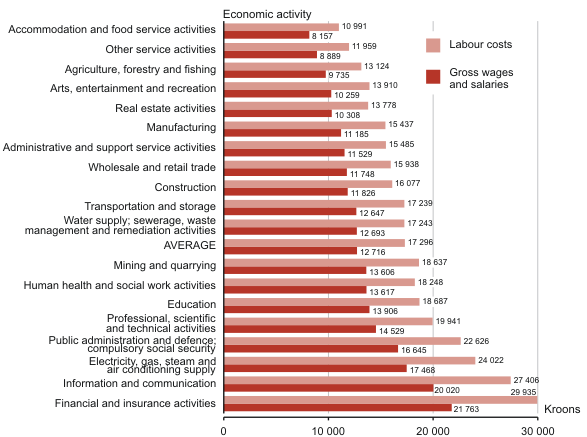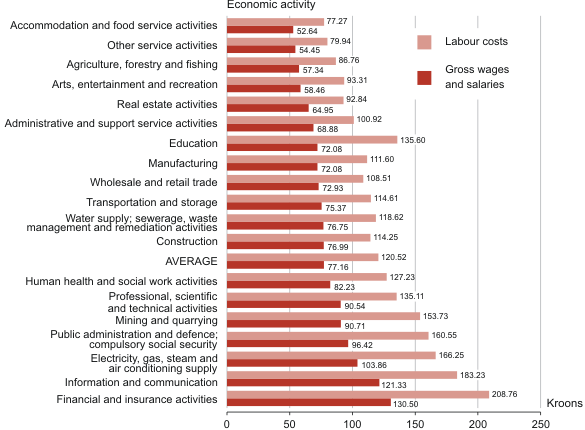The decrease of the average monthly gross wages and salaries continued
In the 1st quarter of 2009 compared to the corresponding quarter of the previous year, the average gross wages and salaries decreased for the first time during 16 years. Although the average wages in the 2nd quarter were bigger than in the 1st quarter, the decrease of the monthly gross wages continued in the 2nd quarter.
Also real wages which took into account the influence of the change in the consumer price index continued decreasing in the 2nd quarter. In the 2nd and 3rd quarter of 2008 real wages increased slightly over 3% and in the 4th quarter decreased 1.3%. In the 1st and 2nd quarter of 2009 real wages decreased by 4.5% and 4.1%, respectively. As of the end of June, the number of employees decreased 9.9% compared to the same period of the previous year.
Compared to the 2nd quarter of 2008, the average monthly gross wages and salaries increased the most in electricity, gas, steam and air conditioning supply (8.5%). The monthly gross wages and salaries decreased the most in mining and quarrying (16.3%).
Compared to the 2nd quarter of 2008, the average hourly gross wages and salaries increased the most in real estate activities (10.9%). The increase was most influenced by the growth of irregular bonuses compared to the same period of the previous year. The gross hourly wages decreased the most in agriculture, forestry and fishing (12.1%).
The average gross wages and salaries were 12,336 kroons in April, 12,127 kroons in May and 13,693 kroons in June.
In the 2nd quarter of 2009, the employer’s average monthly labour costs per employee were 17,296 kroons and the average hourly labour costs were 120.52 kroons. Compared to the 2nd quarter of 2008, the average monthly labour costs per employee decreased 3.5% and the average hourly labour costs increased 0.8%.
Compared to the 2nd quarter of 2008, the average monthly labour costs per employee increased the most in electricity, gas, steam and air conditioning supply (9.4%) and decreased the most in mining and quarrying (15.4%).
Compared to the 2nd quarter of 2008, the average hourly labour costs increased the most in real estate activities (14.3%) and decreased the most in agriculture, forestry and fishing (12.3%).
Statistics Estonia conducts the survey of wages and salaries statistics on the basis of international methodology since 1992. In 2009, the sample includes 11,263 enterprises, institutions and organisations. The average monthly gross wages and salaries have been given in full time units to enable a comparison of different wages and salaries, irrespective of the length of working time. Calculations of the monthly gross wages and salaries are based on payments for actually worked time and remuneration for time not worked. The hourly gross wages and salaries do not include remuneration for time not worked (holiday leave pay, benefits, etc.). In short term statistics, the average gross wages and salaries are measured as a component of labour costs. Labour costs include gross wages and salaries, employer’s contributions and employer’s imputed social contributions to employees.
| Year | 1st quarter | 2nd quarter | 3rd quarter | 4th quarter | |
|---|---|---|---|---|---|
| 2005 | 8 073 | 7 427 | 8 291 | 7 786 | 8 690 |
| 2006 | 9 407 | 8 591 | 9 531 | 9 068 | 10 212 |
| 2007 | 11 336 | 10 322 | 11 549 | 10 899 | 12 270 |
| 2008 | 12 912 | 12 337 | 13 306 | 12 512 | 13 117 |
| 2009 | 12 147 | 12 716 |
Average monthly gross wages and salaries and monthly labour costs per employee, 2nd quarter 2009

Average hourly gross wages and salaries and hourly labour costs, 2nd quarter 2009
